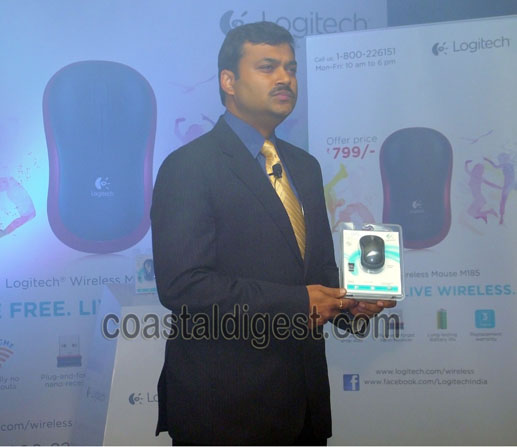
Mangalore, January 20: Logitech India on Friday unveiled their latest product in the wireless product category, the Logitech Wireless Mouse M185 in the city.
The latest in the wireless range series, the Logitech Wireless Mouse M185 forms an integral part of the “Live Free and Live Wireless Campaign” by Logitech. The mouse has been crafted to give optimum levels of convenience to the users. Powered by Logitech Advanced Optical Tracking, the Logitech Wireless Mouse M185 can run for up to 12 months without requiring a battery change. It comes with a smart sleep mode to extend battery life and a helpful indicator light to eliminate low-power surprises.
The product is the latest entrant in Logitech's portfolio of wireless products which includes wireless keyboards and combos that are ideal solutions for the audience across segments. All products are designed to deliver uncompromising performance in beautiful packages for everyone.
The mouse features Logitech's tiny plug-and-forget nano-receiver, which is so small you can plug it into a USB port and forget about it. Logitech Advanced 2.4 GHz wireless connectivity is built in, and delivers a dependable connection with virtually no delays or dropouts.
Commenting on the launch, Subrotah Biswas, Country Manager of Logitech India and South West Asia said, “Logitech believes in providing enhanced consumer experience to aid productivity and to give them the joy of being immersed in the digital world. Logitech Wireless Mouse M185 is yet again an example of our world-class product design and technology integration.”
He added: “With the industry moving towards adopting wireless solutions and products, Logitech sees a huge potential in emerging markets. While we have built a strong presence for our consumer offerings across the country through our retail network, Logitech is now also focusing on building their presence in emerging markets like Kochin, Vizag, Coimbatore to capture mid-market clients for hardware, software and IT services. Moreover, we will now also be focusing on enhancing customer experience through attractive product display in order to make the customer interface more interactive.”
The inauguration also marks a step to amplify its retail presence in the Southern markets starting with Mangalore by focusing more consumer experience. Through this initiative, Logitech aims at reaching out to potential customers in smaller towns, which aims at reaching out to potential customers in smaller towns, which are beyond the top eight metro cities, as these markets command a huge untapped potential.
“We are extremely pleased to enter the retail market with a diverse range of products that will encompass a diverse segment of audience” said Mr. Biswas. “The Indian consumer today expects world class quality, service and aesthetics at an affordable price. We believe that Logitech India's legacy of innovation backed by its engineering and manufacturing expertise can fulfill these expectations.” He further added. “The Logitech Wireless Mouse M185 is specifically engineered to help our customers do more in their personal and professional lives - and it advances our industry-leading vision for wireless solutions that deliver performance without compromise and enable them to be mobile and unrestricted.”






Comments
Add new comment